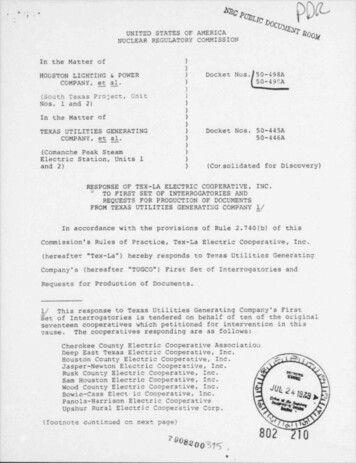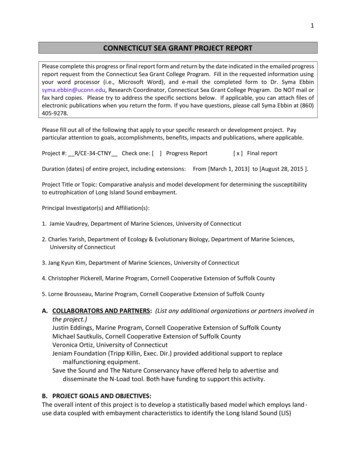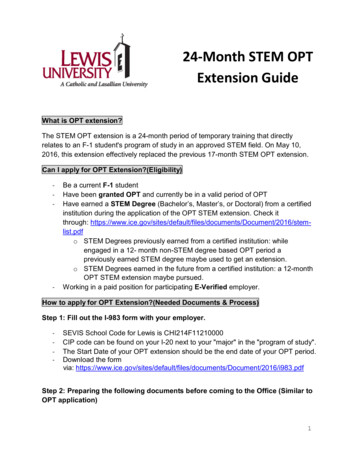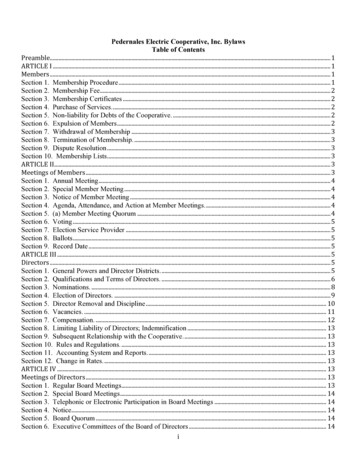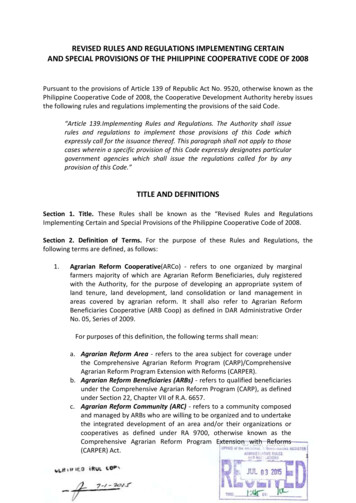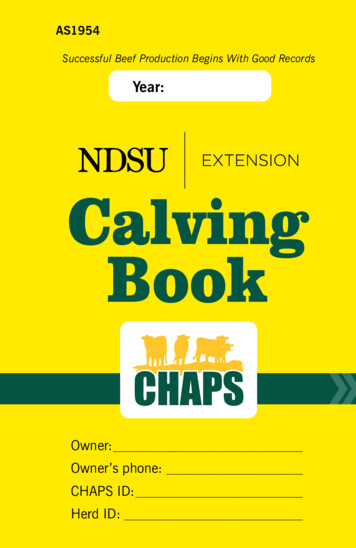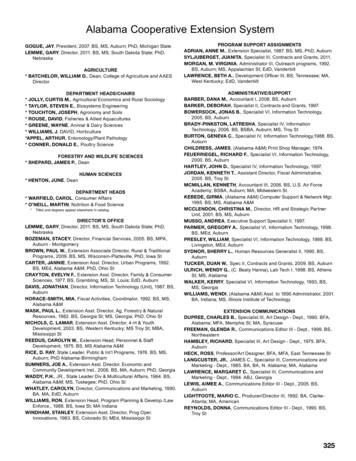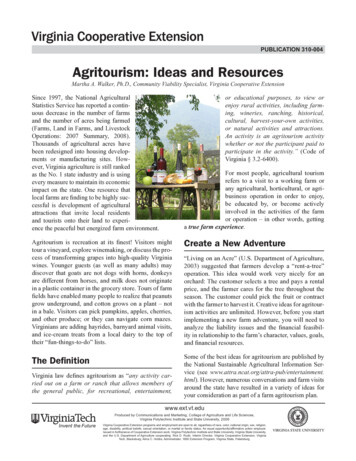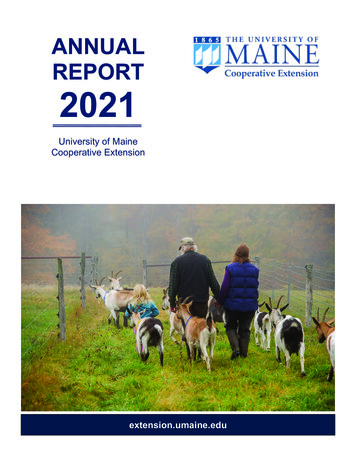
Transcription
University of California Cooperative ExtensionMaster Gardener ProgramADMINISTRATIVE HANDBOOK FORPROGRAM STAFFUniversity of California Cooperative ExtensionAgriculture and Natural Resources1111 Franklin Street, 10th FloorOakland, CA 94607-5200Master Gardener WebsiteJune 1, 2011
UNIVERSITY OF CALIFORNIA COOPERATIVE EXTENSIONMASTER GARDENER PROGRAMADMINISTRATIVE HANDBOOKFORPROGRAM STAFFThis Master Gardener Program Administrative Handbook for Program Staff (Handbook)covers the policies and procedures that govern the Master Gardener Program (MGP), aneducational and public service component of the University of California, Agriculture andNatural Resources (ANR). As a University of California Cooperative Extension (UCCE)education program, UCCE MGP is designed to teach and effectively extend information toaddress gardening needs in many communities throughout the State of California. UCCE MGPvolunteers promote the application of basic environmentally appropriate gardening practicesthrough organized educational programs that transfer research-based knowledge and information.These policies are established to insure the educational and administrative integrity of all UCCEMGP activities and are administered and interpreted by the County Director in consultation withANR administration.This Handbook and any subsequent revisions to it are established by UCCE MGP staff and ANRadministrators a fter careful r eview and a nalysis by U CCE M GP s takeholders, i ncluding s taff,volunteers, and clientele. The Statewide MGP Coordinator renders final decisions on policy andprocedure modifications in consultation with ANR administration.Handbook sections will be reviewed and revised periodically as need with approved revisionsposted on the ANR Website. (For the latest policy statement, always refer to the Handbookposted on the Web).i
UNIVERSITY OF CALIFORNIA COOPERATIVE EXTENSIONMASTER GARDENER PROGRAMADMINISTRATIVE HANDBOOK FOR PROGRAM STAFFTABLE OF CONTENTSChapter One: Introduction and Program Background .1I.II.III.Introduction .1Brief History of the Master Gardener Program .1UCCE MGP Core Values and Intended Impacts .1Chapter Two: Master Gardener Program Team and Organizational Structure .6I.II.Roles and Responsibilities of ANR UCCE.6MG Volunteer Roles and Responsibilities.9Chapter Three: MG Volunteer Status oduction .10Recruitment .10Training .11Certification (Passage of Qualifying Examination) .11Appointment (First Year of UCCE MGP Service) .12Reappointment (Second and Subsequent Years of UCCE MGP Service) .13Inactive Status .14Reinstatement .15Resigned Status .15Transfer of Appointment from One California County to Another .16Limited Active Status Reappointment .16MG Volunteer Recognition.17Non-Renewal, Suspension, and/or Termination of a MG VolunteerAppointment .18Chapter Four: Training, Qualifying Continuing Education and Qualifying Service .22I. Training Responsibility.22II. UCCE MGP Volunteer Training (“MG Volunteer Trainee” Status) .22III. Qualifying Continuing Education Activities .24IV. Qualifying Service Activities .24V. Documentation of Qualifying Continuing Education & Service Activities .26VI. Guidelines for Performance of MG Volunteer Service Activities .26VII. Policy on Pesticides and Related Chemicals: Use by MG Volunteers .27ii
Chapter Five: Program Administration .28I. Introduction .28II. Accidents, Injuries and/or Incidents .28III. Background Investigation .28IV. Complaint Process for MG Volunteers (Formal & Informal) .30V. Confidentiality and Privacy .33VI. Conflict of Interest and/or Conflict of Commitment .33VII. Contracts and Grants .33VIII. Cost Recovery .33IX. Email and Websites.34X. Facilities Use Agreements (FUAs) for MGP Activities .35XI. General and Financial Administrative Requirements .37XII. Gifts (to UCCE MGP) .38XIII. Gifts (to MG Volunteers) .38XIV. Handbook Administration.38XV. Health and Safety .42XVI. Honoraria .43XVII. Mailing Lists .44XVIII. Master Gardener Associations Separately Incorporated Prior to 1996 .44XIX. Newsletters .44XX. Name and Logo – UC, ANR, MGP, and/or UCCE County .45XXI. Nondiscrimination/Affirmative Action Policy .46XXII. Records Requests .46XXIII. Records Retention .46XXIV. Risk Management .46List or Revised Pages 49iii
UCCE MASTER GARDENER PROGRAMADMINISTRATIVE HANDBOOK FOR PROGRAM STAFFCHAPTER ONEINTRODUCTION AND PROGRAM BACKGROUNDI.INTRODUCTIONThe University of California Cooperative Extension (UCCE) Master Gardener Program(MGP) is an educational program designed to teach and effectively extend information toaddress home gardening and non-commercial horticulture needs in California. UCCE isthe outreach arm of UC’s division of Agriculture and Natural Resources (ANR). MasterGardener volunteers (MG volunteers) promote the application of basic environmentallyappropriate horticultural practices through UCCE-organized educational programs thattransfer research-based knowledge and information. The UCCE MGP is a statewideprogram of the University of California Agriculture and Natural Resources.II.III.BRIEF HISTORY OF THE MASTER GARDENER PROGRAMA.From its beginnings in 1972 in King and Pierce counties in Washington, the MGPquickly expanded to Oregon, Arizona, New York, Michigan, and Washington,D.C. Today there are MGPs in all 50 states, the District of Columbia, and fourCanadian provinces.B.In California, the UCCE MGP was originally planned and initiated by UCCEspecialists, campus faculty, regional administrators, and County advisors. TheUCCE MGP has been an active program, growing from pilot programs in 1980 inSacramento and Riverside counties, to over 44 UCCE MGP County basedprograms in 2010. By 2010, over 17,095 people had been certified as MGvolunteers in California after receiving training in basic horticulture and pestmanagement. In 2010, there were over 4,900 active MG volunteers who donatemore than 258,000 volunteer hours assisting home gardeners on an annual basis.UCCE MGP staffs have generally determined local program organization,operational guidelines, activities, and subject matter content. UCCE MGP staffand MG volunteers throughout the state also support one another throughinformal networks.UCCE MGP CORE VALUES AND INTENDED IMPACTSA.The UCCE MGP utilizes trained and certified MG volunteers at the County levelto conduct research-based educational programs to meet urban horticulture andpest management needs of local residents. The certified MG volunteers providean organized approach to addressing demands for information and problemsolving help from non-commercial horticulture clientele and focus on educationalprograms that address the Strategic Vision of UC ANR.1
UCCE MASTER GARDENER PROGRAMADMINISTRATIVE HANDBOOK FOR PROGRAM STAFFB.The ANR Strategic Vision are criteria for designing and implementingeducational activities and measuring educational impacts which are based on thefollowing:1.UCCE MGP activities focus on education, not service.2.UCCE programs provide information and teach practical and usable skills,but MG volunteers do not generally provide garden labor or consultantservices. UCCE programs are neutral and unbiased toward specificcommercial products, services, and support groups. UCCE MGP staff andMG volunteers may not solicit or perform contract services for personalgain while representing UCCE.3.Activities meet identified Strategic Vision Initiatives and clientele needs.UCCE MGP educational activities target adult home gardeners (oftencalled “clientele”) and their needs in various counties. The activities arefocused and incorporate the identified the Strategic Vision of ANR .Participants and audience help determine program content and deliverymethods. Ideas for program improvement are regularly sought fromclientele. Some MG volunteers also work with community and schoolyouth (garden based learning activities) mainly through adult leaders andteachers in gardening activities, while others work cooperatively withUCCE 4-H Youth Development Program (4-H YDP) staff and volunteers.4.MG volunteers are guides to learning and respect others’ viewpoints andabilities.UCCE programs respond to a range of individual learning styles, abilities,and backgrounds. MG volunteers provide appropriate availableinformation while respecting alternative viewpoints. They are guides tolearning. They present horticulture technology and appropriate gardenmanagement information, including multiple options to solving localgarden problems. In this way, the UCCE MGP helps clientele make moreinformed garden management decisions.5.Educational activities are inclusive, not exclusive.UCCE MGP methods and content are evaluated to assure information isnot exclusively held and that UCCE MGP educational programs areavailable to the gardening public on an equal opportunity basis inaccordance with UC and federal affirmative action/diversity policies.UCCE MGP educational efforts are available to all, limited only byUCCE’s resources.2
UCCE MASTER GARDENER PROGRAMADMINISTRATIVE HANDBOOK FOR PROGRAM STAFF6.MG volunteers extend only research-based and technically accurateinformation.UCCE programs extend information that is based on peer-reviewedresearch that flows through the Cooperative Extension educational system.MG volunteers provide information with honesty and to the best of theirabilities, and refer more complex queries to more qualified UCCE MGPstaff. Problem-solving options are discussed, but specificrecommendations are only given within specified guidelines (see thisHandbook, Section III. J.).7.MG volunteers encourage improved environmental quality and sustainablegardening practices.Environmental issues are key to many UCCE educational programpriorities, including support for improved environmental quality and wiseresource management.8.MG volunteers emphasize “learn-by-doing” methods.UCCE MGP teaching methods emphasize hands-on demonstration andprovide opportunities for home gardeners to practice new skills.9.MG volunteers teach new skills, validate achievement, and encourageextending to others.UCCE programs recognize new skills learned. Appropriate methods areused to teach improved gardening skills, build individual confidence, andencourage application of new skills. Further, to extend the UCCE MGPimpact, those receiving information from MG volunteers are encouragedto share new insights and skills with family, friends, and neighbors.10.Activities build community support for UCCE through improvedvisibility.UCCE educational activities feature appropriate, accurate information,packaged and advertised by UCCE for local clientele consumption. AllUCCE programs, information, and activities are readily identifiable asproducts of UCCE. MG volunteers dress appropriately to their role andwear identifying name badges (see Handbook, Section VII.B.10 forexample of badge). All distributed information is identified with theUCCE official name and address, and encourages additional contacts. MGvolunteers communicate about the range of local UCCE programs offeredand invite further contact.3
UCCE MASTER GARDENER PROGRAMADMINISTRATIVE HANDBOOK FOR PROGRAM STAFFC.Intended Program Impact1.UCCE MGP staff and MG volunteers organize to extend educationalservices to the widest audiences possible. Intended UCCE MGP impactscan be categorized into four important areas:a.Healthier Plantsi.ii.iii.b.Healthier Environmenti.ii.iii.iv.c.More vegetables and fruits consumed.More positive gardening experiences.More new skills learned and recognized.More gardens in the community.Better health through gardeningHealthier Communityi.ii.iii.iv.v.D.Optimum water use.Improved soil quality.Reduced reliance on pesticides.Reduced green waste going to landfills.Healthier Gardenersi.ii.iii.iv.v.d.Increased understanding of plant/people interaction.Appropriate selection, placement, and care of plants.Integrated pest-management practices.More people gardening.More positive experiences.More group involvement.Improved communications skills.Improved cultural understanding.County UCCE MGP Initiation1.The UCCE MGP is a Statewide program operated at the County level toaddress home gardening and non-commercial horticultural issues andneeds. In general, an UCCE advisor, and ultimately the County Directorin the UCCE County office makes the decision on whether to initiate alocal UCCE MGP. UCCE MGP staff also plan and manage the scope ofthe UCCE MGP and MG volunteer activities. The UCCE MGP staff isresponsible for the selection, training, certification, and support of MGvolunteers. Routine procedures and day-to-day management of the UCCEMGP may be delegated to non-academic UCCE staff or MG volunteers,4
UCCE MASTER GARDENER PROGRAMADMINISTRATIVE HANDBOOK FOR PROGRAM STAFFbut the academic quality, educational focus, and impact of the UCCEMGP are the responsibility of the County academic staff.2.To initiate a new County UCCE MGP, the appropriate UCCE advisordevelops a proposal and recommends to the UCCE County Director theestablishment of the UCCE MGP as part of the advisor’s overallresponsibilities. Before initiating a County UCCE MGP, the CountyDirector should consult with the Statewide MGP Coordinator. TheCounty Director makes the final decision.3.In the absence of an UCCE advisor to oversee the UCCE MGP, and withfunding for an appropriate staff coordinator position, the County Directormay decide to initiate a local UCCE MGP based on County Directoroversight of the program. The UCCE MGP staff coordinator must betrained in volunteer management, with training in plant sciences stronglypreferred. The County Director must discuss UCCE MGP initiation withthe Statewide MGP Coordinator before launching the program.4.Likewise, should the UCCE advisor propose terminating an existingUCCE MGP in the County, she/he must consult with the UCCE CountyDirector, who will consult with the Statewide MGP Coordinator. TheUCCE MGP should be periodically evaluated to judge its impact/benefitto UCCE, home gardeners, cost and need in comparison with resources(including programmatic and administrative oversight) available for theconduct of a quality program. Before the County Director makes adecision to terminate the local UCCE MGP, impact on the trained, activevolunteers, as well as clientele, must also be considered.5
UCCE MASTER GARDENER PROGRAMADMINISTRATIVE HANDBOOK FOR PROGRAM STAFFCHAPTER TWOMASTER GARDENER PROGRAM TEAM AND ORGANIZATIONAL STRUCTUREThis Handbook section describes the roles and responsibilities of the people who design, create,and evaluate research, outreach, and educational activities in the UCCE MGP. It also recognizesthe importance of everyone involved in UCCE MGP: Administrators of the U.S. Department ofAgriculture, colleagues in other land-grant universities and the California State University andCommunity College systems, arboreta and botanic gardens, as well as UC departmental faculty;ANR administrators; and UCCE County Directors, UCCE MGP staff, and MG volunteers.I.ROLES AND RESPONSIBILITIES OF ANR UCCEA.The UC ANR Vice President, is the Director of UCCE and the AgriculturalExperiment Station (AES), and is responsible for all Statewide programs,including the UCCE MGP.B.The UC ANR Associate Vice President for Programs and Strategic Initiatives isthe Associate Director of the AES and UCCE, is the Chair of the ANR ProgramCouncil, is the primary programmatic leader for ANR research and extensionactivity and also serves as statewide administrative leader for County UCCEprograms, is responsible for leadership of ANR’s Statewide programs, and is theprogram liaison with UCCE, the AES, and campus deans and oversees theResearch and Extension Centers.C.The Associate Vice President—Business Operations is responsible for fiscaland planning oversight for ANR activities and maintains administrative liaisonwith Cooperative Extension, the Research and Extension Centers, StatewidePrograms, County Programs, and campus deans.D.The ANR Controller and Business Services Director is responsible for financialoversight, internal controls, administrative policies, business contracts, riskmanagement, insurance, business and financial services, and computer services.E.The ANR Affirmative Action Contact provides materials, resources, andtraining for staff and volunteers on clientele documentation and outreach activitiesin cooperation with the three regional offices. The affirmative action office alsohandles discrimination complaints and supports the process of decision-makingabout outreach activities and interpretation of policies and regulations related todiversity, civil rights, and affirmative action.F.The Program Support Unit provides programmatic support in key areas to thoseworking on initiatives, programmatic advocacy efforts, statewide programs andleadership groups within ANR6
UCCE MASTER GARDENER PROGRAMADMINISTRATIVE HANDBOOK FOR PROGRAM STAFFG.The Landscape Horticulture Specialist, appointed jointly between theDepartments of Environmental Horticulture and Landscape Architecture on theDavis campus, conducts a statewide extension education and applied researchprogram focused on problems in landscape horticulture, and serves as a statewideprogrammatic resource for the UCCE MGP. The Landscape HorticultureSpecialist conducts research and education programs in cooperation with CountyUCCE advisors, UCCE specialists, and campus faculty in areas related to theintroduction, evaluation, and management of vegetation in urban landscapes.Responsibilities include close collaboration with the UC Davis Arboretum andother UC arboreta and botanic gardens. The Landscape Horticulture specialistwill enhance programmatic linkages among MG volunteers, County UCCEadvisors, government agency professionals, and campus faculty, particularlythrough the Urban Horticulture workgroup.H.Other Cooperative Extension Specialists in ANR contribute their respectiveprogrammatic expertise in areas applicable to home gardening and pestmanagement, facilitate linkages to other UC experts, and assist in volunteertraining. UCCE specialists and other ANR experts are responsible, asappropriate, for contributing to MGP resources, such as the California MasterGardener Handbook.I.The Statewide MGP Coordinator is an administrative and programmaticresource for the UCCE MGP. The Statewide MGP Coordinator’s responsibilitiesinclude coordination and standardization of MGP training activities, developmentof statewide outreach initiatives that support Core Issues, and the use of distancetechnologies to improve delivery of the programs. The Statewide MGPCoordinator assists UCCE MGP staff and volunteers in interpreting thisHandbook and will serve as a primary resource in all matters of UC policy andprocedure. S/he will be responsible for the California Master GardenerHandbook, ensuring timely revisions by working with the appropriate specialistsand other resource persons in UC. The Statewide MGP Coordinator reportsprogrammatically to the Program Leader for Agriculture Productivity.The UCCE MGP Policy Advisory Committee is organized by the StatewideMGP Coordinator and includes a number of key stakeholders who are consultedon policy issues. The UCCE MGP Steering Committee is organized in the samemanner, for purposes of reviewing programmatic issues.J.UCCE County Directors are responsible for determining, in consultation withRegional Directors, whether counties will sponsor and manage MGPs. UCCECounty Directors have final authority regarding all programmatic andadministrative issues relative to the MGP in their County. County Directorsare responsible for ensuring that UCCE MGPs conform to UC and ANR policies;federal, state, and local laws; safety and health regulations; affirmative actionrequirements; and with Statewide UCCE MGP goals, policies, and guidelines.County Directors review MGP certification materials and appoint/reappoint7
UCCE MASTER GARDENER PROGRAMADMINISTRATIVE HANDBOOK FOR PROGRAM STAFFindividual MG volunteers. This appointment/reappointment responsibility maybe delegated to the UCCE MGP Advisor or Coordinator. County Directors alsohave the responsibility of excusing from further service volunteers who do notfollow policies and guidelines, or who do not meet UCCE MGP standards ofservice. In some cases, County Directors directly manage local UCCE MGPsand/or supervise non-academic staff that have experience in volunteermanagement, with training in plant sciences strongly preferred. These staffmembers are responsible for routine UCCE MGP procedures and day-to-dayoperations.K.The County UCCE MGP Coordinator may be a CE advisor, County Director orstaff program representative under academic supervision. The decision to initiatea local UCCE MGP is generally made by a farm advisor and the County Directorin a UCCE County office. UCCE academic staff plan and manage the scope ofthe UCCE MGP and volunteer activity and are responsible for the selection,training, certification, and support of MG volunteers. Routine procedures andday-to-day management of the MGP may be delegated to non-academic staff orvolunteers, but the academic quality, educational focus, and the impact of theUCCE MGP are the responsibility of the County UCCE academic staff.L.County Program Representatives help UCCE academic staff manage localUCCE MGPs. Routine UCCE MGP procedures and day-to-day management maybe delegated to an administrative position, which is typically a paid UC programrepresentative or County staff position supervised by the farm advisor or CountyDirector responsible for the UCCE MGP. In some counties, the programrepresentative has major responsibility for managing all operational aspects of theCounty UCCE MGP including supervising volunteers and arranging horticulturaltraining. In other counties, the farm advisor directly manages the UCCE MGP andthe program representative works only a few hours weekly; functioning, forexample, as a communication liaison among volunteer committee chairs.M.Cooperative Extension (UCCE) Advisors working in the area of urbanhorticulture collaborate with UCCE specialists, faculty, other professionals andcommunity members to develop innovative and creative applied research andeducational programs to meet the needs of local gardeners and non-commercialhorticulture clientele. Farm advisors with a significant program assignment in thearea of urban horticulture may, with the approval of the County Director, initiate aUCCE MGP and assume primary responsibility for its management. In somecases, farm advisors with primary responsibility for commercial environmentalhorticulture, agriculture, or a related field may assume this responsibility. In theabsence of an advisor to oversee the UCCE MGP, this responsibility may beassumed by the County Director with an appropriate staff coordinator position.Farm advisors may directly manage all operational aspects of the UCCE MGP orsupervise non-academic staff and delegate responsibility for routine UCCE MGPprocedures and day-to-day management. These advisors are responsible forrecommending appointments and annual reappointments of volunteers to County8
UCCE MASTER GARDENER PROGRAMADMINISTRATIVE HANDBOOK FOR PROGRAM STAFFDirectors. Other farm advisors who conduct programs for commercial clientele inagriculture, horticulture, pest management, natural resources and other areascontribute their respective programmatic expertise applicable to the UCCE MGPand assist in MG volunteer training.Organizational andInformation FlowChart for theStatewide MasterGardener ProgramUC AgriculturalExperiment StationsUniversity of CaliforniaANRAgriculture and NaturalResourcesStatewide MGProgramCooperative ExtensionCounty-basedAdvisors/CDsProgram Rep II and .50FTE Analyst IIMG CoordinatorCampusMaster GardenerVolunteers(& County-based)SpecialistsII.MG VOLUNTEER ROLES AND RESPONSIBILITIESNew MG volunteers are periodically recruited and trained, as required, to fulfill the needsof UCCE MGP County programs. County residents selected to become MG volunteersreceive formal training in horticulture, pest management, and educational methods fromUCCE MGP staff and other qualified instructors. MG volunteers are responsible to theCounty Director and, through him/her, to the ANR UCCE administrators.9
UCCE MASTER GARDENER PROGRAMADMINISTRATIVE HANDBOOK FOR PROGRAM STAFFCHAPTER THREEVOLUNTEER STATUSI.II.INTRODUCTIONA.MG volunteers agree to support local UCCE MGP educational programs, goals,and procedures as administered by the County UCCE office. UCCE MGP iscommitted to supporting a diverse group of individuals who are enthusiastic aboutbeing trained to serve as MG volunteers in extending UCCE’s outreach capacityto home gardeners.B.A MG volunteer is anyone eighteen (18) years of age or older who, on an unpaidbasis, agrees to provide a service or conduct an activity that supports the goals ofthe UCCE MGP. Such MG volunteers are recruited, oriented, trained, andannually appointed as part of the County UCCE MGP, so that they may undertakeand achieve specific UCCE MGP programmatic objectives. After completing theUCCE MGP training, passing an examination, signing the Annual VolunteerAgreement materials, securing background investigation clearance, andsatisfactorily completing other miscellaneous requirements, MG volunteertrainees are proposed by the UCCE MGP staff to the County Director forappointment as certified MG volunteers, who then serve as “agents” of UC whenin the course and scope of their UCCE MGP duties.C.The County UCCE MGP staff may choose to use gardening volunteers in amanner other than that described in this Handbook (including providing trainingmore limited than that described below). However, these volunteers may not becalled UCCE Master Gardener volunteers and the County gardening programsmay not be called the UCCE Master Gardener Program.RECRUITMENTA.UCCE recruitment activities for new UCCE MG volunteers must be designed toassure that a diverse group of adults in the local community become aware of theUCCE MGP and its opportunities.B.All adults interested in participating as MG volunteers in the UCCE MGP mustcomplete a Master Gardener Volunteer Application Form (see Appendix 2).Most UCCE County offices use a face-to-face interview process in the selectionof MG volunteer trainees, often using currently appointed MG volunteers asinterviewers. This provides an opportunity for information exchange regardingthe UCCE MGP. While there are no specific standard criteria for the selection ofMG volunteer trainees, potential trainees must be wi
Oakland, CA 94607-5200 . Master Gardener Website. June 1, 2011. i . Natural Resources (ANR). As a University of California Cooperative Extension (UCCE) education program, UCCE MGP is designed to teach and effectively extend information to . through organized educational programs that transfer research-based knowledge and information.
